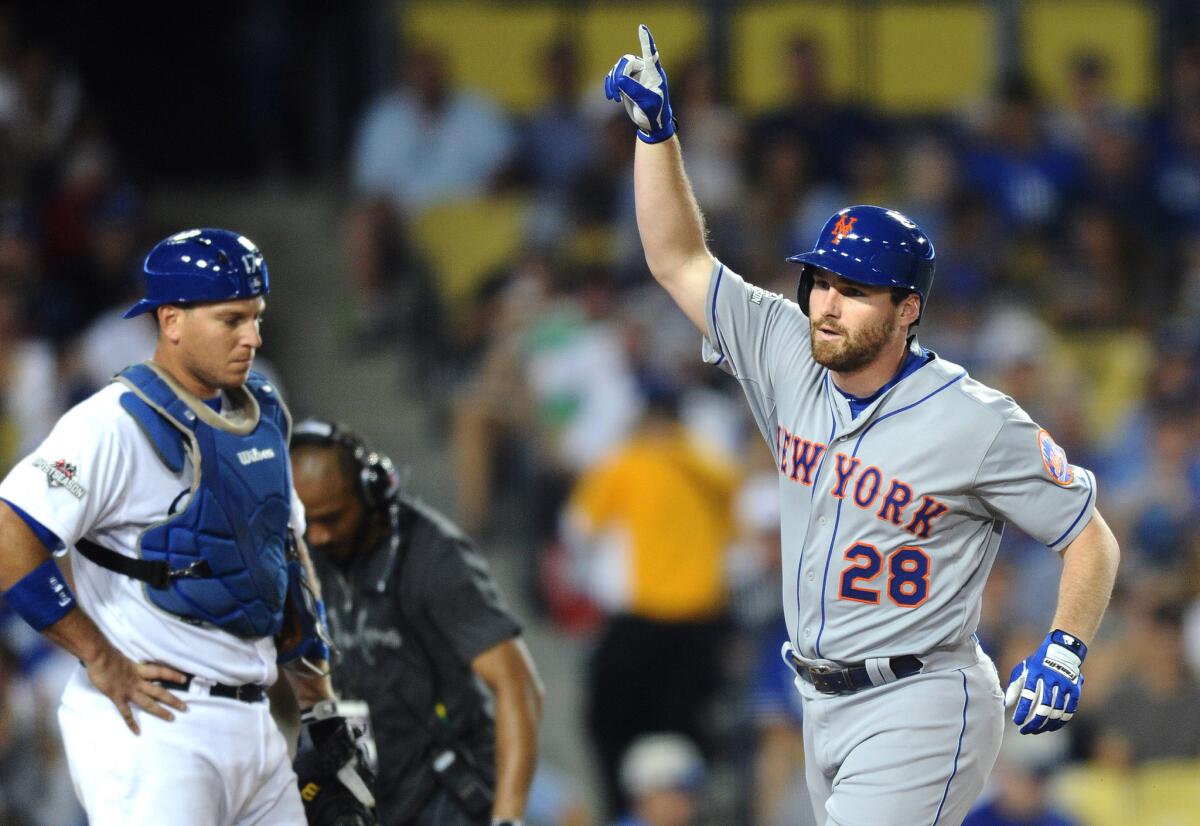Left-handers give Dodgers’ Clayton Kershaw problems

Mets infielder Daniel Murphy raises his arm in front of Dodgers catcher A.J. Ellis after hitting a solo home run against Clayton Kershaw in the fourth inning of Game 1 of the NLDS.
- Share via
As the Dodgers opened the playoffs without an ailing Vin Scully, we couldn’t help but think about him, and not only to send a stadium full of good wishes.
We thought back to the spring of 2008, when Scully first called a game in which Clayton Kershaw pitched. At that point, Kershaw was a minor leaguer, a first-round draft pick full of hope and hype.
He was 19 years old. He wore No. 96 on his back.
Kershaw unleashed one of his now-famous curve balls, the ones that appear to fall out of the sky. Scully had seen it all, but he had not seen that pitch. He branded the pitch immediately: “Public Enemy No. 1.”
It is a nasty pitch for any batter to try to hit, but particularly unfair to left-handed batters. It is a primary reason why most managers stack the lineup with right-handed batters against Kershaw. Futility might follow anyway, but why abet it?
When the New York Mets unveiled their lineup for Game 1 of the National League division series on Friday, they had a leadoff hitter that bats left-handed. They had a cleanup batter that bats left-handed. They had a slugging first baseman that bats left-handed.
And it worked.
The Mets did not pummel the mighty Kershaw. But Daniel Murphy, he of the left-handed swing, hit a solo home run in the fourth inning, putting the Mets ahead for good.
Of the four hits the Mets got off Kershaw, all were hit by left-handers – two singles by Curtis Granderson, a single off Kershaw’s foot by Lucas Duda, and the home run by Murphy.
Add a couple walks, and the left-handed hitters batted 10 times against Kershaw and reached base six times.
“Lefties, they had a good approach,” Kershaw said. “I felt a little more comfortable against the righties.”
He did not know why. He rarely faces left-handers. He wondered if that might be the reason.
“He’s so good, it really doesn’t matter what side of the plate you’re on,” Mets Manager Terry Collins said. “But if you have all right-handers against him and he gets into a groove, he’ll carve you up. So you’ve got to give him something different to look at, in my opinion.”
Collins, managing his first postseason game 21 years after managing his first regular-season game, certainly read the Kershaw numbers correctly. The on-base percentages against Kershaw: .239 for right-handed batters, .231 for left-handed hitters.
In his last three post-season starts, he has given up three home runs to left-handers: to Matt Carpenter of the St. Louis Cardinals in the first game of last year’s NLDS, to Matt Adams of the Cardinals in the last game of last year’s NLDS, and to Murphy on Friday.
The Dodgers lost all three games. And, yes, Murphy said, he had watched video of Kershaw pitching in last year’s playoffs.
But, no, he was not claiming to have figured Kershaw out, at least not publicly.
“My first at-bat, he chewed me up and spit me out,” Murphy said.
And the second at-bat? A fastball, about as down the middle as down the middle can get.
“He makes so few mistakes that, when someone capitalizes on him, we’re surprised,” Murphy said.
Collins ultimately decided to let his best hitters bat, no matter whether they batted left-handed or right-handed. He did not out-think himself, and his team won.
The Dodgers did not lose on Friday because of Kershaw, of course. Jacob deGrom, the Mets’ starter, was simply better – no runs, no unintentional walks, 13 strikeouts.
DeGrom is three months younger than Kershaw. He is a converted shortstop, and he played college ball, so he did not make his major league debut until Kershaw already had won his first Cy Young award.
In the regular season, Kershaw has started 242 games, deGrom 52. In the postseason, Kershaw has started nine games, deGrom one.
The number of postseason victories is the same: one apiece. And, while we thought that the Cardinals were Kershaw’s Kryptonite in October, we now have to wonder whether left-handers might be as well.
Follow Bill Shaikin on Twitter @BillShaikin
More to Read
Are you a true-blue fan?
Get our Dodgers Dugout newsletter for insights, news and much more.
You may occasionally receive promotional content from the Los Angeles Times.











